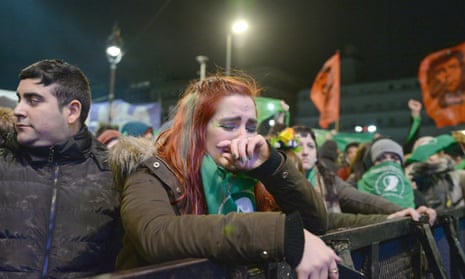If anyone needs evidence of the continuing power of the Catholic church, the vote in Argentina’s senate to maintain the country’s ban on almost all abortions provides it.
The failure of the bill to legalise abortion in the first 14 weeks of pregnancy is a blow to the majority of Argentinians, who backed reform, and to thousands of women forced to resort to illegal terminations.
But it will be hailed by the church, and in particular by Pope Francis, the first Argentinian pontiff. Despite progressive views on many social justice issues, he has remained unyielding on matters relating to women’s control of their bodies.
Francis, who was archbishop of Buenos Aires before being elected pope in 2013, has maintained close links to the country of his birth.
According to the Clarín newspaper, he personally requested anti-abortion legislators to lobby their senate colleagues to reject the bill.
Priests and bishops spoke forcefully against abortion from the pulpit. As senators debated the bill, the church held a “mass for life” at the Buenos Aires Cathedral.
In his sermon, Cardinal Mario Aurelio Poli said abortion “will always be a tragedy” and is “far from being a solution”. He also called on senators to “safeguard the right to life of all, especially the weakest and most vulnerable”.
On Thursday, Clarín’s headline was: “The church, the key player that managed to stop the law.”
A few weeks ago, Pope Francis described abortion as the “white glove” equivalent of the Nazi-era eugenics programme.
Speaking at a meeting of an Italian family association, he said: “Last century, the whole world was scandalised by what the Nazis did to purify the race. Today, we do the same thing but with white gloves.”
He urged families to accept children “as God gives them to us”.
Currently abortion is allowed in Argentina – an overwhelmingly Catholic country – only in cases of rape, or if the mother’s health is in danger.
Activists estimate that 3,000 women in Argentina have died of illegal abortions since 1983, and 45,000 to 60,000 women are hospitalised each year due to complications from such procedures.
The vote in the Argentina senate comes less than three months after Ireland, another predominantly Catholic country, voted overwhelmingly in a referendum to legalise abortion in what was widely seen as a blow to the church’s authority.
Francis is visiting Ireland this month amid evidence that growing numbers of people there are rejecting the church’s teachings.
But as the church’s authority wanes in western Europe, it remains a powerful influence elsewhere in the world.
In the past 50 years, Catholicism has shifted southwards. More than 40% of the world’s 1.2 billion Catholics live in Latin America, but sub-Saharan Africa has seen the biggest growth in Catholic congregations in recent decades – from 45 million in 1970 to 176 million in 2012.
Asia has also seen a growth in Catholicism and now represents almost 12% of the total Catholic population in the world, or 137 million people.
In great swaths of the world, the Catholic church is a force to be reckoned with. The vote in the Buenos Aires senate is the latest example of that.










